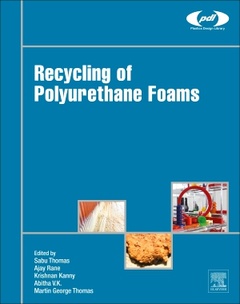Description
Recycling of Polyurethane Foams
Plastics Design Library Series
Coordinators: Thomas Sabu, Rane Ajay Vasudeo, Kanny Krishnan, VK Abitha, Thomas Martin George
Language: English
Subjects for Recycling of Polyurethane Foams:
Keywords
Air sealant; Alkanolamine; Amine; Ammonia; Asphalt; Biodecomposition; Blowing agent; Catalyst; Chemical depolymermization; Chemical recycling; Chemolysis; Combined chemolysis; Decomposition; Degradation; Degradation mechanism; Depolymerization; Durability; Elastomer; Environmental impact; Environmental impacts; Glycolysis; Isocyanates; LCA; Lightweight mortar; Lightweight plaster; Mechanical depolymerization; Molding; PU foam; PU foam waste; Physical recycling; Polymerization; Polyol; Polyols; Polyurethane; Polyurethane coating; Polyurethane foam; Polyurethane foam wastes; Polyurethane scrap; Polyurethanes; Powdering; Reaction injection molding; Recycling; Recycling codes; Recycling system; Recycling techniques; Slabstock; Thermal degradation; Thermoplastic; Thermosetting; Waste management; Wastes
146 p. · 21.4x27.6 cm · Hardback
Description
/li>Contents
/li>Readership
/li>Biography
/li>Comment
/li>
Recycling of Polyurethane Foams introduces the main degradation/depolymerization processes and pathways of polyurethane foam materials, focusing on industrial case studies and academic reviews from recent research and development projects. The book can aid practitioners in understanding the basis of polymer degradation and its relationship with industrial processes, which can be of substantial value to industrial complexes the world over. The main pathways of polymer recycling via different routes and industrial schemes are detailed, covering all current techniques, including regrinding, rebinding, adhesive pressing and compression moulding of recovered PU materials that are then compared with depolymerization approaches.
The book examines life cycle assessment and cost analysis associated with polyurethane foams waste management, showing the potential of various techniques. This book will help academics and researchers identify and improve on current depolymerization processes, and it will help industry sustainability professionals choose the appropriate approach for their own waste management systems, thus minimizing the costs and environmental impact of their PU-based end products.
1. Introduction to polymers 2. Polyurethane foam chemistry 3. Recycling techniques 4. Economic and environmental impact of plastic wastes, management of plastic wastes, mechanical recycling, feedstock recycling, sorting and separation of mixed plastics, future trends in plastic waste management 5. Degradation vs. Decomposition 6. Introduction to chemical depolymerization 7. Chemical depolymerization of polyurethane foam via glycolysis 8. Chemical depolymerization of polyurethane foam via hydrolysis 9. Chemical depolymerization of polyurethane foam via ammonolysis and aminolysis 10. Chemical depolymerization of polyurethane foam via combined chemolysis methods 11. Life cycle analysis of polyurethane foam wastes 12. Applications of chemically depolymerized polyurethane foam 13. Applications of mechanically grounded polyurethane foam
Engineers and sustainability professionals in industries using polyurethane, including packaging, insulation, upholstery, bedding, apparel, and electronics. students, researchers, and scientist/faculty in the disciplines of Chemistry, Physics, Polymer Science, Materials Science, Chemical Engineering and Mechanical Engineering
Professor Sabu Thomas is the Director of Centre for Nanoscience and Nanotechnology, Mahatma Gandhi University, Kottayam, Kerala, India. He is also currently the Chairman of the Trivandrum Engineering Science and Technology Research Park (TrESPARK), Trivandrum, Kerala, India. He was the former Vice Chancellor of Mahatma Gandhi University, Kottayam, Kerala, India. Prof. Thomas is a highly committed teacher and a remarkably active researcher well-known nationally and internationally for his outstanding contributions in polymer science and nanotechnology. He has published over 1400 research articles in international refereed journals. and has also edited and written 210 books. His H-index is 140 and total citations are more than 94,000. He has supervised 125 PhD theses. He has received many international and national awards and recognitions. Under the leadership of Prof. Thomas, Mahatma Gandhi University has been transformed into a top University in India.
Ajay Vasudeo Rane (Dr.) is currently a Post-Doctoral Research Fellow in the Department of Mechanical Engineering at Durban University of Technology. His areas of research include structural, mechanical, and morphological properties of materials (specially polymer composite materials). Dr. Ajay Vasudeo Rane is a member of the Royal Society of South Africa, the South African Institution of Mechanical Engineering, affiliate member of the South African Institution of Chemical Engineers and, a member of the Korean Society of Mechanical Engineers. He has edited five books and has contributed book chapters and technical manuscripts in peer reviewed journals and presented research works at national and international conferences.
Krishnan Kanny (Dr./Prof.) is currently Director and Full Professor in the Department of Mechanical Engineering at Durban University of Technology, South Africa. He is also the Director of the Composites Research Group. Professor Kanny holds a PhD in Materials Science and Engineer
- Offers a comprehensive review of all polyurethane foam recycling processes, including both chemical and mechanical approaches
- Assesses the potential of each recycling process
- Helps industry-based practitioners decide which approach to take to minimize the cost and environmental impact of their end product
- Enables academics and researchers to identify and improve upon current processes of degradation and depolymerization
These books may interest you

Polymer Nanocomposite Foams 232.80 €

Polymer Nanocomposite Foams 93.24 €


